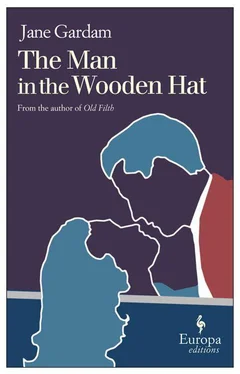“Elisabeth,” said Dulcie, “wanted ten children.”
“Oh, they all say that. Posh brides with no brains.”
“Elisabeth has brains,” said Willy. “She was at Bletchley Park in the war, decoding ciphers, and Filth passed out top in the Bar Finals. And they’re neither of them posh!”
“Dry as sticks,” said Susan.
“No,” said Willy.
“Wasn’t there some sort of scandal about her ?” Susan’s eyes gleamed.
“ No ,” said Willy.
“Oh, well,” said Susan. “Her memory’s not much. There’s a house called Dexters here in the village. I passed it out riding. It’s down that lane that divides. One up one down. You can’t see it from the road.”
“Oh, nonsense, we’d know it.”
“The Dexter place, all you can see is down its chimney unless you go round to the front entrance, down the hill, towards Donhead St. Anthony. It’s been a ruin for years. I asked because it’s being all done up.”
“Darling, why didn’t you tell them?”
“Why should they live here? I can’t.”
So the Feathers settled down for a London winter in the Temple, Filth working on his Pollution Bill, excellent Sunday lunches in the Inner Temple Hall after church, theatres, old friends and an occasional weekend in Surrey. They grew dull. Filth went back to Hong Kong for a while, but Betty stayed behind.
Old Willy died in the New Year and Betty asked Dulcie to stay with her in the flat, which was close to the Temple church where the memorial service would be held. Betty had gone to the funeral of course, in the Donheads, and seen Willy lowered into the Dorset soil in his local churchyard. Susan had not come from America but she would be at the memorial service. Betty invited her to stay with her in the Temple, too, but this was left uncertain. Which is to say that Susan did not reply.
Oh, well, thought Elisabeth.
It was a splashy, showery day and the congregation arrived shaking umbrellas and stamping their wet shoes in the porch of the Temple church. Willy had been so contentedly old, they were all telling each other, that this was a celebration of his life, not a lament. There were a few old lawyers from Singapore and Hong Kong and some Benchers from all the Inns of Court who faced each other sanguinely across the chancel, occasionally raising a hand in greeting.
Betty sat wanting Filth there. She felt very sad. Dulcie next to her was perfectly dressed in Harrods black with a glint of Chanel, eyes streaming, and sulky Susan was gulping and snuffling into a big handkerchief. Betty hadn’t bothered much with what to wear or whom to greet. She sat thinking of Willy and old Shanghai and nursery rhymes a thousand years ago. I do know love when I see it, she thought. He loved me and I loved him. Nobody much left. And she tried to ignore the hatchet face, directly across from her, of Fiscal-Smith in a black suit worn slippery with funerals.
There was a scuffle and commotion and, across the church, Fiscal-Smith made room ungraciously for a stumbling latecomer who was nodding left and right in apology. The Master of the Temple was already climbing to the pulpit to read from the Holy Bible. The latecomer looked at Betty across the chancel, directly head-on to him, and gave a delighted wave. It was Harry Veneering.
“Come on out to tea,” he said afterwards.
They were all gathering outside the church or crammed into the porch and some had begun to walk over the courtyard to the wake in Parliament Chamber. It was not quite raining but damp, and many of them were old. The senior Benchers were filing away from the church through their private door under umbrellas, and Dulcie and Susan were being cared for by the Master of the Temple.
“Come on, don’t go that way,” said Harry Veneering to Betty. “Come with me round here past these gents on the floor,” and he took her elbow and led her away among the circle of Knights Templar on their tombs, swords in place. Chins high.
“Promising juniors who didn’t quite make it,” said Harry. “I’d have been the same if I’d gone to the Bar. The Army was for me. Mind, the Army didn’t seem to do them a lot of good, proud bastards pretending to be like Jesus. Killing everybody. Taxi!”
“Where are we going?”
“The Savoy.”
“But it’s only a two-minute walk.”
“We’re not walking. I’m an Officer in the Brigade of Guards.”
“And,” she said, “we haven’t booked.”
“Oh, they’ll find me a table.”
He gave the saluting doorman a wave, and took her through the foyer laughing and smiling around. Yes, of course, sir, a table. No, of course not, sir. Not too near the piano. They sat in an alcove where lamplight and warmth denied the soggy day.
“Yes,” he said, “ full afternoon tea and, yes , the glass of champagne. Naturally. And—” he looked at her and took her hand.
“Harry, stop this at once. They’ll think you’re my — what is it called? — toy boy!”
“Oh, but I am ,” he said. “Mrs. Waterproof and galoshes! — Hey — look at my right thigh!” He stuck out his leg just in front of the approaching waitress, and there were shrieks and laughter.
“Harry— will you sit down. You’re no better than when you were nine.”
“I wish they served lobsters,” he said.
Shriek.
“And I wish I was under the table again, missing my plane back to school. I wish — I wish I’d never grown up.”
“Harry, how dare you! How can you? All we did!”
“Sorry. Yes. Look at my thigh. It’s twice the width of my left one, twice as strong. Whenever I have X-rays it makes them faint. Wonderful operation. Did you read in the papers? I climbed the Eiger.”
“Yes, I did.”
“Not that I’m the first.”
“No, you’re not. And how did it get in the papers?”
“I attract attention. Like my father.”
Pouring pale-gold tea she said, “And where is your father? And your mother? I thought they’d be here at the service.”
“Pa’s in Fiji doing an Arbitration. I suppose Ma’s at home in HK. I don’t hear much from her.”
“You hear from your father?”
“Oh, yes. But I’m in his black books at the moment.”
“Why?”
“Don’t go into it. Extravagance. I think he rather likes to boast about it really. Makes me seem a toff.”
“He’s been very good to you.”
“So have you, Miss Raincoat. You are my true and only love. Someone told me you were with me all night long before I nearly had my leg chopped off.”
A waiter came with the champagne.
“It’s true,” Harry said to him. “She was with me all night long. Out on the Russian steppes. She stopped them amputating my leg. Then things got out of hand and we were attacked by wolves. .”
“Will that be all, sir?”
“Oh, no!” said Harry. “Lots more to come.”
“Harry,” she said. “I must go back to the wake and look after Dulcie. She’s staying with me.”
“Where’s Hyperion?” he asked. “Can’t he look after her? — Filth, I mean. Sir Edward?”
“He’s abroad. He’s arbitrating, too. He’s retiring soon and then we’re going to live in Dorset, near Dulcie.”
But he was staring at the clock across the room. “Good God in heaven,” he said. “Good God ! — The time! I have to go,” and he began to pat his pockets. “I’m dreadfully late. I — my wallet!”
“It’s all right,” she said. “I’m taking you out to tea. Next time you can give me dinner. At the Ritz.”
“I will! I’d love to. Mrs. Burberry, my angel of light,” and he was gone, flitting through the room and out of the foyer through the glass doors into the Strand.
She followed after paying the huge bill and walked back into the Temple and into the sombre celebration for her dear old friend. As she came into the room she seemed to see him somewhere in the crowd watching her and lovingly shaking his head.
Читать дальше












